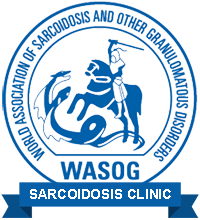Angiotensin-converting Enzyme as a Predictor of Extrathoracic Involvement of Sarcoidosis
Keywords:
Sarcoidosis, ACE, extrathoracic involvementAbstract
Background: Sarcoidosis is a multisystem disease, with extrathoracic involvement occurring in 25–50% of patients. Multi-organ involvement is often associated with a more chronic and severe course. The value of 18F-fluorodeoxyglucose positron emission tomography/computed tomography (FDG-PET/CT) in diagnosing extrathoracic involvement in sarcoidosis has been demonstrated; however, because of the radiation dose and high cost, indications for its use must be well defined. Angiotensin-converting enzyme (ACE) is produced by active granuloma cells; thus, serum ACE (sACE) levels may reflect the total granuloma load. Objectives: In this retrospective study, we evaluated the diagnostic value of sACE in the detection of extrathoracic involvement in sarcoidosis. Methods: 43 patients with biopsy-proven sarcoidosis underwent FDG-PET/CT during the initial workup. Positive findings were classified as thoracic and/or extrathoracic. The diagnostic value of sACE was estimated using sensitivity, specificity, and area under the receiver operating characteristic curves (AUCs). Results: Of the 43 patients studied, 17 (39.7%) had extrathoracic involvement. In this group, sACE values were higher than in patients without extrathoracic involvement (331 vs. 150, p=0.002) and correlated positively with extrathoracic involvement (R:0.532 p=0.02). Receiver operator characteristic curve analysis revealed an AUC of 0.816 [95% confidence interval: 0.669–0.963, p=0.002], 70.6% sensitivity and 80% specificity at the sACE cut-off value. Conclusions: In sarcoidosis, extrathoracic involvement may be life threatening or indicative of poor outcome. sACE levels are easily determined and may predict extrathoracic involvement. In patients with sarcoidosis, sACE levels can be used to better define those who would benefit from FDG-PET/CT examination to detect extrathoracic involvement. (Sarcoidosis Vasc Diffuse Lung Dis 2015; 32: 318-324)
Downloads
Published
Issue
Section
License
This is an Open Access article distributed under the terms of the Creative Commons Attribution License (https://creativecommons.org/licenses/by-nc/4.0) which permits unrestricted use, distribution, and reproduction in any medium, provided the original work is properly cited.
Transfer of Copyright and Permission to Reproduce Parts of Published Papers.
Authors retain the copyright for their published work. No formal permission will be required to reproduce parts (tables or illustrations) of published papers, provided the source is quoted appropriately and reproduction has no commercial intent. Reproductions with commercial intent will require written permission and payment of royalties.

This work is licensed under a Creative Commons Attribution-NonCommercial 4.0 International License.




